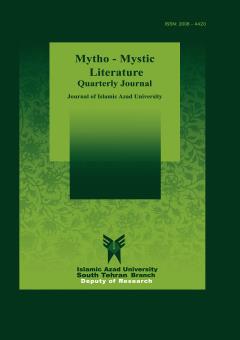The Relationship between Man and God in Nikos Kazantzakis' Mystical Perspective
Subject Areas : Mystic LiteraturAli bahadori 1 , لیلا Mohammadi ghotbe 2
1 - The Assistant Professor of Theology, Farhangian University, Zeinabyyeh Branch
2 - MA in Philosophy of Religion, Tehran University
Keywords: god, love, Mystical literature, Man, Nikos Kazantzakis,
Abstract :
The power of literature to connect civilized and cultured individuals across different times and places is undeniable. For centuries, mystical literature has served as a bridge for those who believe in transcendence and spirituality, uniting passionate individuals who share common concerns. Nikos Kazantzakis, a writer with a rich body of literary and mystical works, is a prime example of these concerned and rebellious individuals whose mystical literature is the focus of his writing. This article examines Kazantzakis's mystical perspective, exploring his approach to the mystical relationship between man and God through a descriptive-analytical method. The results of this research reveal that, in accordance with Kazantzakis's spiritual worldview, God and man have a significant impact on the creation of divine works. In expressing the relationship between man and God, Kazantzakis emphasizes love, liberation from worldly attachments, the conflict between body and soul, human existential suffering, and inner confrontation with God. He also views death as a transcendental phenomenon that leads to the immortality of the human soul and its connection with God.
دامبروفسکی، دانیل ا، 1397. فلسفه دین افلاطونی از منظری پویشی. ترجمة علیرضا حسنپور، طیبه حجت زاده. تهران: ققنوس.
رستمی، شهلا، 1393. «بررسی سبک و ساختار ادبی و سلوک عرفانی در کتابهای ترجمة رسالة قشیریه، اسرارالتوحید و کشفالمحجوب و تطبیق آنها با سیر و سلوک از کازانتزاکیس یونانی»، رسالة دانشگاه آزاد اسلامی واحد تهران مرکزی.
زرخواه، مریم، 1391. «بیان معنویت از دیدگاه نیکوس کازانتزاکیس»، پایاننامة دانشکده ادبیات و علوم انسانی دانشگاه سمنان.
سعیدی، سیروس، 1368. «چند نامه از نیکوس کازانتزاکیس»، نشریه ادبستان فرهنگ و هنر. (2)، صص. 12-10.
عابدی، کامیار، 1380. «نیکوس کازانتزاکیس؛ روایتی از جانهای بیقرار»، نشریة کتاب ماه ادبیات. ( 47 و 46)، صص. 46-44.
کازانتزاکیس، نیکوس، 1362 الف. سودوم و گومورا. ترجمة همایون نوراحمر. تهران: مرزبان.
ـــــــــــــــــــ ، 1362ب. آخرین وسوسة مسیح. ترجمة صالح حسینی. چ3. تهران: نیلوفر.
ـــــــــــــــــــ ، 1382. تجربههای معنوی: بیداری. ترجمة مسیحا برزگر. تهران: کتاب خورشید.
ـــــــــــــــــــ ، 1392. به سوی آزادی. ترجمهی محمد دهقانی. تهران: جامی.
ـــــــــــــــــــ ، 1393. گزارش به خاک یونان. ترجمة صالح حسینی. چاپ ششم. تهران: نیلوفر.
ـــــــــــــــــــ ، 1395. باغ سنگی. ترجمة قاسم صنعودی. مشهد: شمشاد.
ـــــــــــــــــــ ، 1397پ. زوربای یونانی. ترجمة حشمت الله آزادبخت. تهران: نوید صبح.
ـــــــــــــــــــ ، 1397ت. برادر کشی. ترجمة محمد ابراهیم محجوب. تهران: امین الضرب.
ـــــــــــــــــــ ، 1400ث. سرگشتة راه حق. ترجمه منیز جزنی. چ12. تهران: امیر کبیر.
ـــــــــــــــــــ ، 1400 ج. آزادی یا مرگ. ترجمه محمد قاضی. چ7. تهران: خوارزمی.
English sources
Charitini Christodoulou. 2012. Dialogic Openness in Nikos Kazantzakis. Cambridge Scholars Publishing.
Daniel A. Dombrowski. 1983. Food for Thought from Saint Ignatius and Nikos Kazantzakis. The John Hobking University Press.
Daniel A. Dombrowski. 1998. Ultimate Reality and Meaning in Nikos kazantzakis. University of Torento Press Jurnal, Vol.21, No.3.
Middleton, Darren. J.N & Bien, Peter .1966. God'S Struggler: Religion in the writings of Nikos Kazantazakis. Mercer Univerdity Predd.
Middleton, Darren. J.N. 2007. Broken Halleluian: Nikos kazantzakis and christian Theology. United Kingdom, Lexington Books.
Oakber, Maria Eugena. 1973. Nikos kazantzakis and Albert Camus. University of Tennessee-Knoxville.
Owens, Lewis. 1999. The Immortal Spirit of Creation; Kazantzakis the Bhagavad Gita. New Blackfrisrs, Vol.80, No. 943.
Poulakidas, Andreas k. 1969. Dostoevsky; kazantzakis' unacknowledged Mentor. Duke University Press on behalf on the University of oregon, VOl.121, No.4.
Qiu, B.A, M.L.S, kui. 1992. Heroic nihilism: Buddhism in the work of Nikos kazantzakis. Ohio state University.
Vonler, B.A, Vava Donowho. 1967. Nikos Kazantzakis' view of Womankind, Council of the North Texas University.
Trakakis, Nick N. 2013. Who is Nikos Kazantzakis' God?. Australian Catholic University.
_||_
Ābedī, Kām-yār. (2001/1380SH) a. “Nikos Kazantzakis; Revāyatī az Jānhāy-ye bī-qarār”. Publication of the Book of the Month of Literature. No. 46 and 47. Pp. 44-46. [In Persian].
Dombrowski Daniel A. (2017/1397SH). Falsafe-ye Dīne Aflātūnī az Manzarī Pūyešī ( A platonic philosophy of religion: a process perspective). Tr. by Alī-rezā Hassan-pūr and Tayyebeh Hojjat-zādeh. Tehrān:Qoqnūs.
Kazantzakis, Nikos. (1982/1362SH). b. Āxarīn Vasvase-ye Masīh (The last temptation of christ). Tr. by Sāleh Hosseynī. 3rd ed. Tehrān: Nīlūfar.
Kazantzakis, Nikos. (2021/1400SH). J. Āzādī yā Marg (Freedom or Death). Tr. by Mohammad Qāzī. 7th ed. Tehrān: Xārazmī.
Kazantzakis, Nikos. (2016/1395SH). Bāqe Sangī (Le jardin des rochers). Tr. by Qāsem San’ūdī. Mašhad: Šemšād.
Kazantzakis, Nikos. (2018/1397SH). T. Barādar Košī (The Fratricides). Tr. by Mohammad Ebrāhīm Mahjūb. Tehrān: Amīno al-zarb.
Kazantzakis, Nikos. (2013/1392SH). be Sū-ye Āzādī (At the palaces of Knossos: a norel). Tr. by Mohammad Dehqānī. Tehrān: Jāmī.
Kazantzakis, Nikos. (2014/1393SH). Gozāreš be Xāke Yūnān. Tr. by Sāleh Hosseynī. 6th ed. Tehrān: Nīlūfar.
Kazantzakis, Nikos. (2021/1400SH). S. Sar-gašte-ye Rāhe Haq (Phtochoules tou theou= God's pauper: st. Francis of Assisi a novel). Tr. by Monīr Jazanī. 12th ed. Tehrān: Amīr-kabīr.
Kazantzakis, Nikos. (1983/1363SH). a. Sodom and Gomorrah. Tr. by Homāyūn Nūr-ahmar. Tehrān: Marz-bān.
Kazantzakis, Nikos. (2003/1382SH). Tajrobehā-ye Ma'navī: Bīdārī (The Saviors of God; spiritual exercises). Tr. by Masīhā Barzegar. Tehrān: ketābe Xoršīd.
Kazantzakis, Nikos. (2018/1397SH). p. Zūrbā-ye Yūnānī (Zorba the Greek). Tr. by Hešmato al-llāh Āzād-baxt. Tehrān: Navīde Sobh.
Rostamī, Šahlā. (2014/1393SH). “Barrasī-ye Sabk va Sāxtāre Adabī va Solūke Erfānī dar Ketābhā-ye Tarjome-ye Resāle-ye Qošīrīyyeh, Asrāro al-towhīd and Kašfo al-mahjūb va Tatbīqe Ānhā bā Seyr va Solūk az Kazantzakis Yūnānī”. Dissertation of Islamic Azad University, Central Tehran branch. [In Persian].
Sa’īdī, Sīrūs. (1988/1368SH). "Čand Nāme az Nikos Kazantzakis”. Adebistan Culture and Art Journal. No. 2. Pp. 10-12. [In Persian].
Zar-xāh, Maryam. (2012/1391SH). “Bayāne Ma’navīyyat az Dīdgāhe Nikos Kazantzakis”. Thesis of Semnan University Faculty of Literature and Human Sciences.


